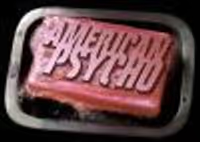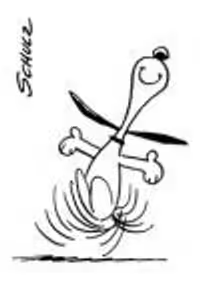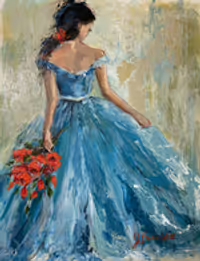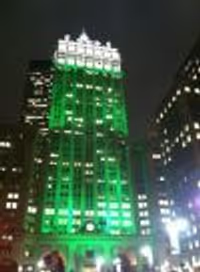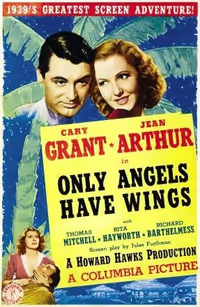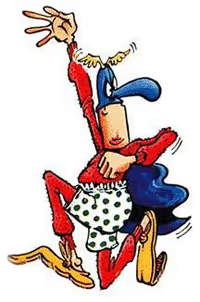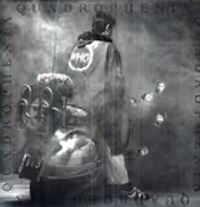When is it appropriate to start applauding for a song?
#25When is it appropriate to start applauding for a song?
Posted: 1/26/15 at 10:05amYeah, because no one ever accidentally thought a song was ending before the real ending until 2009.
bfreak
Broadway Legend Joined: 5/6/11
#26When is it appropriate to start applauding for a song?
Posted: 1/26/15 at 10:07amAn example of it being appropriate I think is when Alan Cumming is finishing up Willkommen and is on his last line, and people start to applaud but I think there the material asks for applause to happen.
#27When is it appropriate to start applauding for a song?
Posted: 1/26/15 at 10:12amI actually agree that it is good to clapp at the end of the song (of course) but sometimes the spirit just moves you. I remember when I was at Smokey Joe's Cafe -- Bj Crosby was singing Fool Fall in Love and it was like going to church. You just had to applaud. It was stunning.
#28When is it appropriate to start applauding for a song?
Posted: 1/26/15 at 10:31amApplauding before the song is actually done is common in the very worst sense of the word.
#29When is it appropriate to start applauding for a song?
Posted: 1/26/15 at 11:18am
"Haterobics- I think early clapping does belong on a list of bad theatre etiquette. If the composer wanted you to start clapping there, then they wouldn't have written the notes that come after that. They would have just ended the song. And I find it disrespectful to the actor singing to drown out the end of their song. They have to work hard to get through the entirety of the song, even if you clap over them, they still have to have the breath support to get through what was written. They can't just give up because you want to start clapping."
The problem here is you are redefining theater as a passive thing that the audience is merely watching unfold. A world where actors are precious about the notes and the words and the emotions, but if those things happen to congeal to a point where it audibly affects an audience in a positive manner, they would be put off and offended. Where a composer has constructed a song to a point where a key change sends a ripple of joy through a crowd, and he loathes that joy for distracting the audience momentarily from his delicate craft. Where the audience is meant to sit there like sheep and just watch genius unfold in delicate quiet, except at specific points where the actors and creative team have decided to allow the audience to clap.
And, ironically, if someone claps early it is making the moment about them rather than the performance. But in your example, you are making the show about the performers, and it's just as equally not about them. The theater is about the combination of the audience and the performers and the orchestra, etc., to all combine to make something transient and hopefully transcendent. Both sides need to be engaged for that to happen.
And to conflate someone experiencing a joy that moves them 3 seconds before you think is appropriate is the height of narcissism. You're saying you know how to applaud appropriately, unlike this other person, and as soon as you do that, you're outside the moment. You are critiquing the moment in which others are actively engaged.
Do I clap too soon at a show? I wouldn't know. I've laughed at a line I found funny when others around me didn't, too, so I should probably have apologized for that, as well.
I'm opposed to people using cell phones, opening loud candies, talking, and all of the usual things people call bad theater behavior. But once we start dictating how people can only behave within the confines of being an engaged audience member, then that seems a step too far.
#30When is it appropriate to start applauding for a song?
Posted: 1/26/15 at 11:25amI would think some performers appreciate it when people clap when they hit the last note of a song.
Bwaydide92
Leading Actor Joined: 5/16/12
#31When is it appropriate to start applauding for a song?
Posted: 1/26/15 at 12:11pm
I am not redefining theatre as a passive thing. I think audience members should fully engage themselves and react to what they are seeing. But their reactions should be to the story. If you laugh at a line that no one else laughs at (which I do all of the time) that's perfectly appropriate. You have different life experiences , so the show is obviously going to impact you in a different way. But you laughing at a line that no one else laughs at just shows that you are engaged in a way that others might not be.
I was at Jersey Boys last week and Nick's final monologue had a great joke in it that the audience died over. We all gave him a round of applause for a good 20 seconds or so. We listened to the full joke, and it landed perfectly and we reacted by applauding. We didn't drown out the rest of his monologue, he was able to pause and move on when we finished laughing. When singing a song, an actor doesn't have that luxury. They have to perform to the dictates of the song.
React in anyway you want to react. But don't take over the performance by drowning out the performers and the work they are doing.
Pootie2
Broadway Legend Joined: 8/1/14
#32When is it appropriate to start applauding for a song?
Posted: 1/26/15 at 12:16pmWell, in context, Menzel does hold that last belted "now" a long time, and she probably varies it from show to show. Hopefully if people started applauding, it was towards the end of the note and not during the pause before that last word. In this case, it's really not a big deal IMO.
#33When is it appropriate to start applauding for a song?
Posted: 1/26/15 at 1:19pm
I always try to start clapping about midway through the song cause I always like to be first. I don't always though, cause sometimes I'm busy texting friends about how good the song is.
I think the larger question is "what is the sound of one hand clapping?"
#34When is it appropriate to start applauding for a song?
Posted: 1/26/15 at 1:36pm
"i feel like theatre etiquette is dying a rapid death on broadway between candy wrappers, texting, vibrating, talking DURING the show, coming in late, and early clapping"
Minus the clapping, I totally agree. Clapping is a joyful sound that comes out of feeling the material, I can't get mad about that. During the last performance of Bridges, people were clapping in the middle of "It All Fades Away" when Steven was singing his face off with the "AAAAAaaaaaaaaaaaaAAAAAAAA!!!!!!" part of "It All Fades Away" ![]()
Clapping is a good thing, and I don't think the actors mind.
#35When is it appropriate to start applauding for a song?
Posted: 1/26/15 at 2:06pm
"I would think some performers appreciate it when people clap when they hit the last note of a song."
Are you including the orchestra when you say "performers?" Or does only the singer count?
#36When is it appropriate to start applauding for a song?
Posted: 1/26/15 at 2:30pmClapping with very few bars left in a song never bugged me. (Starting at the beginning of Idina's final "now", is disruptingly early though) It depends on the context too. Always Starting Over is a power ballad. I think the pre-necessary clapping highlights that the song was a really great number and evoked a strong response in the audience. This opposed to other songs, which could be seen as average or not as hard hitting. What I can't stand is hooting and hollering in between songs or before the song is over. Curtain call...ok...but before that it's just obnoxious.
Gothampc
Broadway Legend Joined: 5/20/03
#37When is it appropriate to start applauding for a song?
Posted: 1/26/15 at 3:07pm
"I go back to "And I'm Telling You..." which I saw in previews. Holliday was getting stopped early and often before the show had even opened."
This was the song/show that I always point to as the beginning of this bad habit. Holliday would be heading into the final stretch of the song:
Push, strike and kill
I'm not gonna leave you
There's no way I will
And I am telling you...
Applause, applause, applause
I think people began using it to demonstrate they were in agreement with what the character was singing.
Then some of the later composers like Andrew Lloyd-Webber (Sondheim in Passion?) kept the music going so that they could control the applause.
#38When is it appropriate to start applauding for a song?
Posted: 1/26/15 at 5:13pm
Comparing etiquette between classical symphony audiences and Broadway audiences? Why would you bother?
In the classical world -- symphonies, opera -- I find the audiences are a bit more, for want of a better word, precious about certain pieces. With that music (and the actual concert format), there is a more reverence with music by Puccini or Mozart (Wagner people are in a whole other class) that they are literally paying attention to every phrasing of the orchestra and the performer. There are many exceptions to performers who go above and beyond in performance, and I am sure I could be shot for saying this, but in the classical arena, technique and style is revered over perhaps one's "acting". People wait till the very end to applaud for famous arias. To be fair to Broadway audiences, I don't think even THEY would be inclined to start applauding before Tosca finishes the end of "Visi D'arte".
I do get annoyed when people will shout out in the middle of performances, unless it is a momentous moment in the show that everyone is waiting for like a key change or a set change or some moment the audience is anticipating -- Elphaba's flight comes to mind. But the people annoyed when audiences begin applauding before the final downbeat of a songt? Ridiculous. Some audiences are just compelled by the moment. This is nothing new. It's noted more now perhaps with audiences lacking certain etiquette. But it happened with Al Jolsen, it happened with George Cohan... And for your pleasure: https://www.youtube.com/watch?v=Tqf55X5PEh0
Updated On: 1/26/15 at 05:13 PM
#39When is it appropriate to start applauding for a song?
Posted: 1/26/15 at 5:34pm
I admit I HATED "And I am Telling You..." when I first saw DREAMGIRLS. I thought the drama stopped dead in its track while we all applauded a very talented young lady. But, in fairness, the same could have been said earlier for any song that stopped A show, from "I Got Rhythm" (1930) to "Who's that Woman?" (1970).
The fact is most of a Broadway audience CANNOT see the conductor. If you ask us to hold a few seconds of silence after every number to make sure it's over, you'll ruin the rhythm of the show.
And well before Miss Holliday, pop singers (Garland, Minnelli, et al.) were holding their last notes out until the audience couldn't help but applaud. And that tradition has migrated to the musical theater.
Which works quite nicely, if you ask me: the singer holds her last note for umpteen bars, during which the applause swells and take over from the musicians. Seamless.
If you must hear the last few measures of vibrato, buy the OC album...
#40When is it appropriate to start applauding for a song?
Posted: 1/26/15 at 5:50pmI wasn't saying look at the conductor, I was saying wait for the performance to be over.
#41When is it appropriate to start applauding for a song?
Posted: 1/26/15 at 5:56pm
The entire show, Fantod? You'll cut the energy level in laugh and that's a big part of most musicals: the energy. You'll have the same problem on a small scale if you wait until 1500 people all decide individual that the song is over, no matter how well the ending is "bumped".
Frankly, with amplification being what it is today, I can applaud full out, shout "Bravo" and STILL hear every note of a soloist.
#42When is it appropriate to start applauding for a song?
Posted: 1/26/15 at 5:59pm
Classical music story--was at a piano recital and in a pause, obviously near the end, someone applauded and he the pianist turned to the audience and yelled SHUUUTUPPPP and went on and played the final few notes. It was quite a few seconds before anyone was game to clap-no-one wanted to be first.
I had taken a friend to their first ever piano recital and the pianist was world famous-what an introduction to stuffy/serious classical music--we hooted, it was so funny [ after the event]!
FB you ALWAYS make me laugh.
#43When is it appropriate to start applauding for a song?
Posted: 1/26/15 at 6:04pm
I would have laughed too, but I'm not sure any of the performing arts need to humiliate their patrons.
My remarks above certainly do NOT apply to classical music (including opera), which has its own rules for audience response. But I am surprised how often these days classical audiences don't know to wait for the conductor to lay down his/her baton.
delongpre
Featured Actor Joined: 12/12/12
#44When is it appropriate to start applauding for a song?
Posted: 1/26/15 at 6:11pmAfter hearing Always Starting Over numerous times, I have to say that I don't remember a time that people DID NOT applaud before the end. But I think it has to do with the build up of energy in the room, what has preceded the song, and how long the note is held. There's a build up that leads to a point where the peak has been reached and Idina sails towards the end. THAT'S where people tend to applaud.Not talking about fangirl obsessive I LOVE YOU applause, but appreciative, moved audience applause. It has never felt rude or overpowering to me. I bet if you ask Idina she would say that it's totally appropriate for people to applaud there.
#45When is it appropriate to start applauding for a song?
Posted: 1/26/15 at 6:24pm
I can't believe people think this is some recent trend.
I go back to "And I'm Telling You..." which I saw in previews. Holliday was getting stopped early and often before the show had even opened.
When I saw Dreamgirls on tour and Fuschia Walker stepped in for Holliday, even though a ton of people walked out as soon as the theatre announced the last-minute replacement, those that stayed gave Walker SEVEN ovations throughout "And I Am Telling You". It was actually quite thrilling to experience the sort of dialogue that was happening between the performer and the audience. The performance and the reaction seemed to be feeding off each other and it was unlike anything I'd ever experienced. I was actually thankful I hadn't seen Holliday in the show.
And then there's the applause for the...wait for it...SLO-MO KICK-LINE REPRISE OF THE CHORUS! So many songs and performances are engineered for immediate audience response. It's not a new trend. Unless by "new", you mean first appearing in the second half of the 20th century.
Gothampc
Broadway Legend Joined: 5/20/03
#46When is it appropriate to start applauding for a song?
Posted: 1/26/15 at 6:34pm
"the singer holds her last note for umpteen bars, during which the applause swells and take over from the musicians."
But in the case of Dreamgirls, they didn't wait until the last note. They started applauding at the final chorus and were applauding during the final bars of chorus singing after she finished. And it was only 2 minutes until intermission. I think they could have waited until the final note of the song.
Pootie2
Broadway Legend Joined: 8/1/14
#47When is it appropriate to start applauding for a song?
Posted: 1/26/15 at 6:39pm
"After hearing Always Starting Over numerous times, I have to say that I don't remember a time that people DID NOT applaud before the end. But I think it has to do with the build up of energy in the room, what has preceded the song, and how long the note is held. There's a build up that leads to a point where the peak has been reached and Idina sails towards the end. THAT'S where people tend to applaud.Not talking about fangirl obsessive I LOVE YOU applause, but appreciative, moved audience applause. It has never felt rude or overpowering to me. I bet if you ask Idina she would say that it's totally appropriate for people to applaud there."
I think you're right. Earlier I was thinking about it in general terms, but for ASO specifically, it's the 11 O'clock power ballad belt number, Menzel's big moment framed in a prior emotional scene. It's gonna happen.
#48When is it appropriate to start applauding for a song?
Posted: 1/26/15 at 7:07pmI clap early because sometimes the song and the performance is begging for it. Sometimes the performer is just holding your heart in their hands and squeezing, and I can't really think about NOT clapping for it. Most times I've seen Cabaret, spontaneous applause follows the "I'm going like Elsie" line, and I think it's totally deserved.
#49When is it appropriate to start applauding for a song?
Posted: 1/26/15 at 7:35pmWhen I saw the revival of FOLLIES in 2011, it kept making me laugh because people were applauding at the beginning of familiar songs. It was like being at a Carpenters concert back in the 70s. I am sure that the minute people heard the opening notes of "We've Only Just Begun" or "Close To You", they would applaud. I had never experienced that in a Broadway theater, so it made me laugh.
Videos




